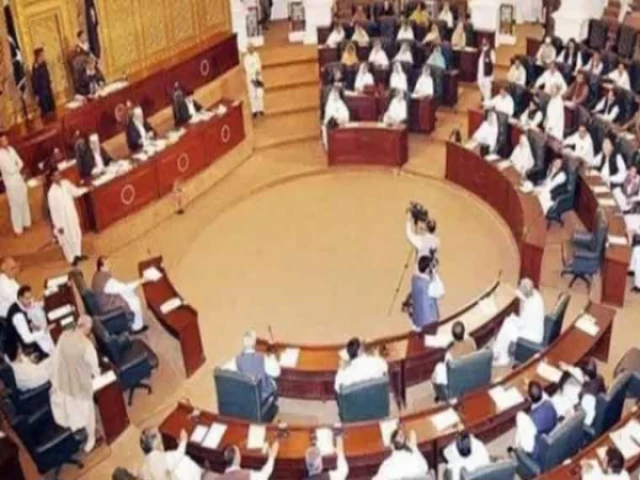MPA Shazia Tehmas proposed to include women from merged districts in tribal jirgas
PESHAWAR:
In a rare show of unity, members of both government and opposition benches in the Khyber-Pakhtunkhwa (KP) assembly on Monday proposed convening an All-Parties Conference (APC) to discuss worsening law and order situation, terrorism and tensions with Afghanistan.
The House unanimously decided to consult the Governor, Chief Minister, political party leaders, civil society representatives and key officials of relevant institutions to resolve the issues.
During a detailed debate on law and order, Speaker Babar Saleem Swati said a committee had already been constituted in the house to deal with the issues.
“This province does not belong to one party; it belongs to all of us,” he said. He invited all political leaders, civil society, bar associations, the chief minister and the governor to come up with suggestions on how to improve peace in the province. He said a briefing would be sought later from the Peshawar Corps Commander and the Inspector General of Police (IGP).
MPA Arshad Ayub said that the deteriorating security situation is the province’s most serious problem and requires immediate and serious attention. MPA Ahmad Kundi suggested that all political parties should sit together and devise a common strategy.
MPA Zahid Chanzeb expressed concern over the treatment of Afghan refugees and cross-border shelling. He said the manner in which Afghans are being expelled could provoke retaliation tomorrow. “The institutions must act wisely – if dialogue was the solution, it should have been held earlier.”
Dr. Amjad Ali said that political parties are pitted against each other while peace and democracy should be their common priority. “Despite 14,000 operations, peace has not been achieved in the province. An APC should be convened immediately so that practical proposals can be agreed upon.”
MPA Shafi Ullah Jan questioned how militants, despite thousands of operations, managed to re-emerge – calling it a serious issue for state institutions.
MPA Anwar Zeb highlighted that thousands of people in tribal districts, especially Bajaur, had been displaced for 48 days due to ongoing operations. “When people return home, new targeted operations begin, resulting in the death and injury of innocent civilians,” he said, adding that peace is only possible if all stakeholders and political elders unite.
ANP parliamentary leader Arbab Usman said his party had borne the brunt of the establishment’s actions but did not want to appear confrontational. “An APC should be kept above political considerations,” he said, adding, “The war in the region is over resources and all eyes are on ours.”
MPA Abdul Ghani said tribal people had always shown courage but were prevented from holding traditional jirgas. “Tribal elders have made it clear that further operations, drone strikes and displacements will not be accepted. The tribal belt cannot withstand more operations,” he said.
Lawyer Mehr Sultana said that since a law and order committee had already been formed, the assembly should be briefed once the meetings are held. She also requested more opportunities for members to discuss their constituencies.
MPA Ashbar Jadoon noted that those dying on both sides of the border “are our own people”. However, he also praised the military’s sacrifices.
“We sleep peacefully in our homes because of them. Afghanistan, which is working on behalf of India, often attacks us – we should avoid involving our army in new fronts,” he said.
MPA Shazia Tehmas proposed to include women from merged districts in tribal jirgas.
She said civil society and political parties already have women members from these areas who understand local issues well. They should be part of these jirgas.
In the end, MPAs unanimously agreed that sustainable peace in KP could only be achieved if all political forces, state institutions and tribal elders sit together and devise a common strategy.
Afridi meets corps commander
Newly elected KP Chief Minister Sohail Afridi held an important one-on-one meeting with Peshawar Corps Commander Lt Gen Umar Ahmad Bukhari, marking his first meeting since assuming office.
According to security sources, the meeting – described as a courtesy call – discussed the province’s security situation and other key issues. Officials confirmed that it is customary for a new chief minister to meet the corps chief soon after taking office.
Former CM Ali Amin Gandapur had earlier met the then Corps Commander accompanied by his cabinet members. However, the new chief minister opted for a one-on-one meeting.



